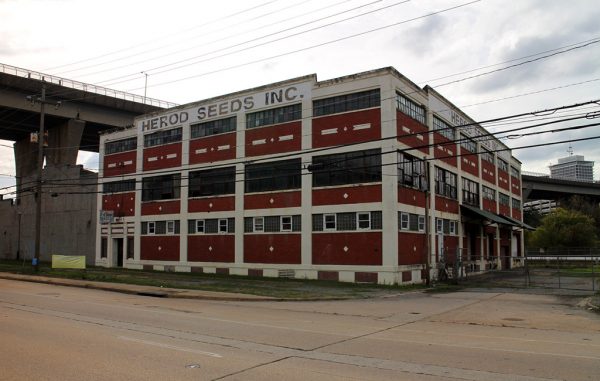
The Herod Seeds building is one of three warehouses on the property below the MLK Bridge. (Jonathan Spiers)
A century-old warehouse slated for conversion to residential use has officially changed hands.
Developer Zac Frederick’s Crescent Preservation & Development Co. closed Dec. 14 on its purchase of the old Herod Seeds building and adjacent property at 904, 908 and 1020 Oliver Hill Way in Shockoe Valley.
The purchase price was just over $2.79 million, city property records show.
Frederick did not return calls seeking comment.
The seller was Norman Herod, who filed a request with Crescent to rezone the property below the Martin Luther King Jr. Memorial Bridge that connects downtown with the city’s East End. City Council approved the rezoning in November.
Documents submitted to the city indicate a residential development is planned for the three parcels totaling 2.4 acres. Three warehouses totaling 46,000 square feet would be redeveloped for residential use, while new residential buildings would be constructed on the property’s unimproved areas, according to the documents submitted by consulting firm Markham Planning.
The documents, which describe the existing buildings as historic, do not specify a total number of residential units or other details about the project. The Herod Seeds warehouse was built in 1909, according to city property records.
The parcels were last purchased between 1987 and 1990, in transactions totaling just under $670,000. Recent city assessments valued the properties collectively at $1.05 million.
The project is the latest in the area for Frederick, whose development group in April purchased the former Duke’s auto repair shop at 2018 E. Broad St in Church Hill.

The Herod Seeds building is one of three warehouses on the property below the MLK Bridge. (Jonathan Spiers)
A century-old warehouse slated for conversion to residential use has officially changed hands.
Developer Zac Frederick’s Crescent Preservation & Development Co. closed Dec. 14 on its purchase of the old Herod Seeds building and adjacent property at 904, 908 and 1020 Oliver Hill Way in Shockoe Valley.
The purchase price was just over $2.79 million, city property records show.
Frederick did not return calls seeking comment.
The seller was Norman Herod, who filed a request with Crescent to rezone the property below the Martin Luther King Jr. Memorial Bridge that connects downtown with the city’s East End. City Council approved the rezoning in November.
Documents submitted to the city indicate a residential development is planned for the three parcels totaling 2.4 acres. Three warehouses totaling 46,000 square feet would be redeveloped for residential use, while new residential buildings would be constructed on the property’s unimproved areas, according to the documents submitted by consulting firm Markham Planning.
The documents, which describe the existing buildings as historic, do not specify a total number of residential units or other details about the project. The Herod Seeds warehouse was built in 1909, according to city property records.
The parcels were last purchased between 1987 and 1990, in transactions totaling just under $670,000. Recent city assessments valued the properties collectively at $1.05 million.
The project is the latest in the area for Frederick, whose development group in April purchased the former Duke’s auto repair shop at 2018 E. Broad St in Church Hill.



Congratulations to Colliers International brokers Bill Mattox and Sara Marie Williamson for their roles in securing this deal for ex-Colliers agent Zac Fredericks, President of Crescent Development. Their relationship has been mutually beneficial. The quest for good housing solutions continues in RVA.
I will say it again. We are headed for a bubble. This property just blocks from Coalter and Littlepage Streets! One of the deadliest intersections in the City. It under the Leigh Street/King bridge and also just down from the City Jail. The jail is routinely the subject of people shooting down the hill from the projects and subsidized housing above it. People walking to and from the jail and probation/parole office, just across the street Oliver Hill Way from this property, are routinely robbed. I dare anyone after dark to walk between the Probation office and the jail!
One more note, this building is also just to the immediate left of the noisy (and new) steam plant for VCU that has barbed wire fences and cages around its HVAC units (that are inside the fence). The stainless steel pipes run just behind the seed building.
The fact that someone would choose to develop apartments in an area that’s a bit “dicey” is not indicative of a pending “bubble”. Demographic trends for apartment development are strong for the next ten years and the recent tax cuts should do nothing but spur more investment in MF. Zac Fredericks has his hands full with this one, but he appears to have done his due diligence appropriately and is confident that he can make it work as workforce housing.